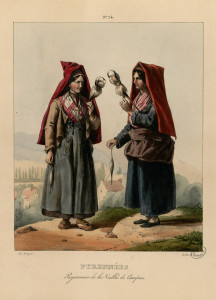Partly work and partly play
Ye must on St. Distaff’s Day.
The days of Christmastide stood outside of ordinary time, from Christmas Eve and Christmas Day and clear through the Twelve Days of Christmas that followed, and now that Epiphany has passed, it is back to the humdrum workaday world. But we’ve been celebrating for two weeks now, and it’s not easy to shift gears so rapidly. This is where St. Distaff comes in.
Back when spinning occupied a great deal of time for most women, the distaff was no stranger to any of them. The distaff is a tool that is part of the process of spinning wool or flax into thread, and that is the first step toward weaving cloth and making clothing for the family. We tend to think of spinning wheels when we picture someone spinning, but the spinning wheel was a later invention; it is the distaff and spindle that were the necessary tools prior to the spinning wheel.
As for St. Distaff? Well, the odd thing about St. Distaff’s Day is that saints are people but there is no St. Distaff. The day’s name just comes out of centuries of tradition, and it has one purpose: to mark the beginning of getting back to work after Christmas. Not that much work got done on St. Distaff’s Day. Quite the contrary. What typically happened was this: Women would get to work at their spindle and distaff, and the men would sneak up and make a valiant attempt at lighting the flax on fire. But the women were smart and kept buckets of water nearby. The flax set aflame was usually quickly extinguished (and more often than not, the men got a good soaking, too). This was the fun and mischief of St. Distaff’s Day.
If it seems unfair that the women had to get to work the day after Epiphany but not the men, worry not, for the men have their time with the first Monday after Epiphany, for then comes Plough Monday, their traditional return to work and to ordinary time. Plough Monday has its own fun and traditions.
And so let this day mark your return to ordinary time now that Christmastide has passed. If you can do something silly alongside the serious business of the day, all the better.
Image: Two fine women with distaffs in hand. A lithograph by Edouard Pingret from the book Pyrénées: Paysannes de la Vallé de Campan by René Ancely, 1834. [Public domain], via Wikimedia Commons.

I would not be happy about having my flax yarn burned…I guess the men will have to go without shirts!
G